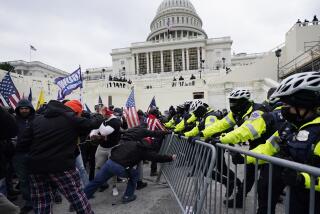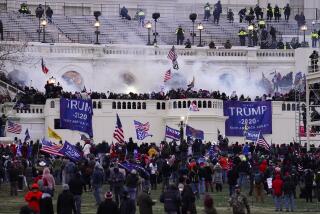High Court OKs Conspiracy Law’s Broad Reach
- Share via
WASHINGTON — The Supreme Court on Tuesday upheld the government’s broad power to imprison those who join a conspiracy to sell drugs or commit terrorism, even when these purported conspirators do not carry out the crime or when the plot has been foiled before they join it.
By law, a conspiracy is a type of guilt by association. It allows the government to prosecute all those who are involved in a drug gang or terrorist activity and to charge the minor players with a major crime.
Citing what he called the “vital importance” of conspiracy law in prosecuting terrorists and drug dealers, U.S. Solicitor Gen. Theodore B. Olson urged the Supreme Court to affirm the broad reach of conspiracy and to overturn the narrower rule adopted by the U.S. 9th Circuit of Appeals for the Western states.
Since 1997, the appeals court has thrown out conspiracy charges against drug sellers who were picked up after agents had foiled a drug-selling plot.
In this reversal of the 9th Circuit, the Supreme Court ruled unanimously that unwitting, would-be conspirators can be imprisoned for joining a plot that has already been broken up.
“The essence of a conspiracy is an agreement to commit an unlawful act,” said Justice Stephen G. Breyer. “That agreement is a distinct evil, which may exist and be punished whether or not the substantive crime ensues.”
Breyer said the law of conspiracy has been well-established for a long time. “The view we endorse today is the view of almost all courts and commentators, but for the 9th Circuit,” he said.
Conspiracy charges also have figured prominently in the war on terrorism.
Because of the conspiracy law, federal prosecutors were able to bring terrorism charges and seek the death penalty against Zacarias Moussaoui, even though he was in jail in Minnesota when terrorists attacked the World Trade Center and the Pentagon on Sept. 11, 2001.
The indictment charged Moussaoui with conspiring to “commit aircraft piracy” and “to murder U.S. employees.” To win a conviction, prosecutors need only link him to the Al Qaeda operatives in Europe who planned the terrorist attacks.
Tuesday’s Supreme Court decision revives the drug conspiracy convictions of two men who picked up a truck that had been left in the parking lot of a shopping mall near Boise, Idaho.
The day before, on Nov. 18, 1997, Nevada state police had stopped the truck near Las Vegas and found inside 369 pounds of marijuana and 15 pounds of cocaine. Together, the drugs were said to be worth more than $10 million.
The two drivers claimed to be ignorant of what was in the truck, but one of them helped police set up a sting.
To keep on schedule, agents used a C-130 cargo plane to fly the drug-laden truck to the Idaho shopping mall. The cooperating driver called a pager number, and the person who returned the message promised to “call a muchacho to come and get the truck,” according to court records.
Three hours later as agents watched, Francisco Recio and Adrian Lopez-Meza drove up in a blue car. Recio drove away in the truck, while Lopez-Meza drove the car.
The two men were stopped and arrested, and they too claimed to be ignorant of the drugs.
All four drivers were convicted on drug conspiracy charges.
Recio and Lopez-Meza, the latecomers, were each sentenced to more than 10 years in prison.
But the 9th Circuit, on a 2-1 vote, reversed their convictions, saying these two “bit players” were probably “hired at the last minute.” The government had not proved the two were part of the drug conspiracy that existed before the day the plot was foiled, said Judges James Browning of San Francisco and Betty Fletcher of Seattle.
Nine of the circuit’s 24 active judges in the Western region voted to reconsider the decision, short of the 13 needed to review the panel’s ruling.
However, the Supreme Court took up the government’s appeal in U.S. vs. Recio.
“In our view, conspiracy law does not contain any ‘automatic termination’ rule,” Breyer said, so Recio and Lopez-Meza can be convicted even if they joined the conspiracy after the police had seized the drugs.
“I’m disappointed, but not surprised,” said M. Karl Shurtliff, a lawyer in Boise who represented Recio. “ All they got in this case was the four drivers, not the big shots in Arizona who set this up.”
More to Read
Get the L.A. Times Politics newsletter
Deeply reported insights into legislation, politics and policy from Sacramento, Washington and beyond. In your inbox twice per week.
You may occasionally receive promotional content from the Los Angeles Times.










